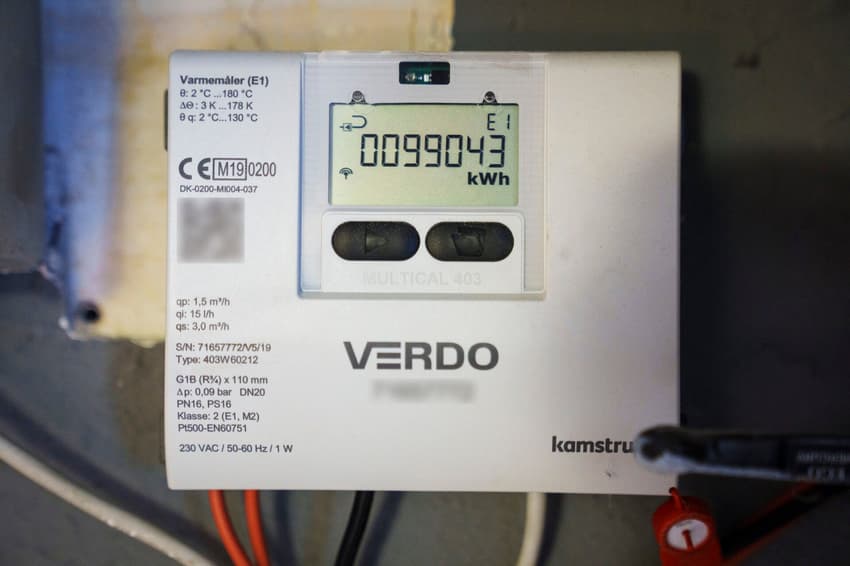Denmark keeps electricity consumption down as higher tax rate returns

High energy prices in 2022 caused people in Denmark to change their consumption habits, and economisation in homes will again become beneficial after a temporary cut to electricity taxes expired.
Despite lower prices for electricity and gas in 2023 compared to 2022, people in Denmark are still using lower amounts of energy, new data from the Danish Energy Agency (Energistyrelsen) show.
Consumption of electricity and gas in May were 8 and 33 percent respectively lower than normal levels according to the agency.
A combination of the war in Ukraine, dry weather and a lack of wind pushed electricity prices to record levels in 2022.
Prices peaked in October at around 5 kroner per kilowatt hour according to official figures. That fell to 3.5 kroner per kilowatt hour in March.
READ ALSO: How people in Denmark are changing their energy use to keep bills down
But the cost of electricity began to rise again after summer set in. That is because a temporary reduction of electricity tax, put in place by the government on January 1st, expired at the end of June.
The fee changed from the minimum permitted by the EU, 0.8 øre (0.008 krone), to 69.7 øre (0.70 krone) per kilowatt hour on July 1st.
Energy sector organisation Green Power Denmark estimates that this change will cost the average family up to an additional 1,723 kroner on their electricity bills for the rest of this year, compared to if the low tax rate had been retained.
Although families are unlikely to welcome the return of higher taxes on their electricity bills, any efforts to save on consumption are good news for supply security now and in the future, Danish Energy Agency deputy director Martin Hansen said.
It remains important to save gas in particular ahead of Denmark’s next “heating season” or fyringssæson, the agency advises.
READ ALSO: EXPLAINED: When should I turn on my heating in Denmark this year?
This is because Denmark will need gas stocks to be full ahead of the colder months.
Should this summer continue to be generally warm and dry, there could be potential problems related to cooling at power plants and transport of fuels due to low water levels in European rivers, according to the senior energy official.
“Denmark is part of a shared European electricity market where we both import and export electricity with our neighbouring countries,” he said.
“That means that both electricity production and consumption in other countries affects supply in Denmark and vice versa,” he said.
High summer temperatures can result in high consumption for cooling purposes, particularly in southern Europe, he said.
Comments
See Also
Despite lower prices for electricity and gas in 2023 compared to 2022, people in Denmark are still using lower amounts of energy, new data from the Danish Energy Agency (Energistyrelsen) show.
Consumption of electricity and gas in May were 8 and 33 percent respectively lower than normal levels according to the agency.
A combination of the war in Ukraine, dry weather and a lack of wind pushed electricity prices to record levels in 2022.
Prices peaked in October at around 5 kroner per kilowatt hour according to official figures. That fell to 3.5 kroner per kilowatt hour in March.
READ ALSO: How people in Denmark are changing their energy use to keep bills down
But the cost of electricity began to rise again after summer set in. That is because a temporary reduction of electricity tax, put in place by the government on January 1st, expired at the end of June.
The fee changed from the minimum permitted by the EU, 0.8 øre (0.008 krone), to 69.7 øre (0.70 krone) per kilowatt hour on July 1st.
Energy sector organisation Green Power Denmark estimates that this change will cost the average family up to an additional 1,723 kroner on their electricity bills for the rest of this year, compared to if the low tax rate had been retained.
Although families are unlikely to welcome the return of higher taxes on their electricity bills, any efforts to save on consumption are good news for supply security now and in the future, Danish Energy Agency deputy director Martin Hansen said.
It remains important to save gas in particular ahead of Denmark’s next “heating season” or fyringssæson, the agency advises.
READ ALSO: EXPLAINED: When should I turn on my heating in Denmark this year?
This is because Denmark will need gas stocks to be full ahead of the colder months.
Should this summer continue to be generally warm and dry, there could be potential problems related to cooling at power plants and transport of fuels due to low water levels in European rivers, according to the senior energy official.
“Denmark is part of a shared European electricity market where we both import and export electricity with our neighbouring countries,” he said.
“That means that both electricity production and consumption in other countries affects supply in Denmark and vice versa,” he said.
High summer temperatures can result in high consumption for cooling purposes, particularly in southern Europe, he said.
Join the conversation in our comments section below. Share your own views and experience and if you have a question or suggestion for our journalists then email us at [email protected].
Please keep comments civil, constructive and on topic – and make sure to read our terms of use before getting involved.
Please log in here to leave a comment.